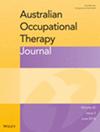An evaluation of intervention appropriateness from the perspective of parents: A peer-mediated, play-based intervention for children with ADHD
Abstract
Introduction
A peer-mediated, play-based intervention has been developed to address social participation challenges experienced by children with ADHD. To facilitate implementation into clinical practice, interventions should be evaluated for appropriateness to the end-user, as well as effectiveness. Previous research demonstrated the approach is effective for improving children's social play skills. This study aimed to evaluate the appropriateness of the intervention for children with ADHD and their families.
Methods
Parents of children with ADHD who participated in the play-based intervention were interviewed 1 month after completion. Parents were asked about their perspective of parent and children's experiences of the intervention, the perceived benefits for children and parents, the logistics of participating, and recommended adaptations to the intervention. Interviews were analysed thematically, and themes were mapped to the elements of the adopted definition of appropriateness to understand whether parents supported the appropriateness of the intervention for their families.
Consumer and Community Involvement
Consumers were not directly involved in the decisions made about this study.
Findings
One core theme, ‘collaborative efforts’, emerged from the data. Major themes comprising the core theme were ‘on the same page’, ‘therapeutic relationship’, and ‘getting the job done’. Three sub-themes of ‘engagement and motivation’, ‘the effort was worth it for the reward’, and ‘Rome wasn't built in a day’ were nested within the major themes.
Conclusion
Parents largely supported the appropriateness of the intervention, indicating it addressed an important goal for their child, participation was a positive experience, and they perceived the intervention to be beneficial. Future adaptions of the intervention are needed to increase its ecological validity and to generalise the strategies to other social environments and playmates, such as peers at school.
PLAIN LANGUAGE SUMMARY
This study looked at an intervention that uses play with peers to help children with ADHD develop their play skills. The researchers wanted to know if parents thought the intervention was a good fit for their families and if it helped their children. Parents gave an interview a month after the intervention ended. They were asked about their thoughts on the intervention, how it helped their children and themselves, how easy it was to take part, and what changes could be made to make the intervention better. After analysing parents' answers, the researchers found parents mostly agreed that the intervention was a good fit. They said it helped their children to play with their peers, and they had a good time doing it. Parents thought the intervention was helpful, they liked that it was a joint effort between them and the occupational therapist, and they felt it was worth the effort. However, they also suggested some changes. They wanted the intervention to fit into other real-life social situations, such as school, so their children could use the skills they learned in other places. Overall, parents thought the intervention was helpful and suitable for their children and themselves, but some changes might make it more helpful.


 求助内容:
求助内容: 应助结果提醒方式:
应助结果提醒方式:


